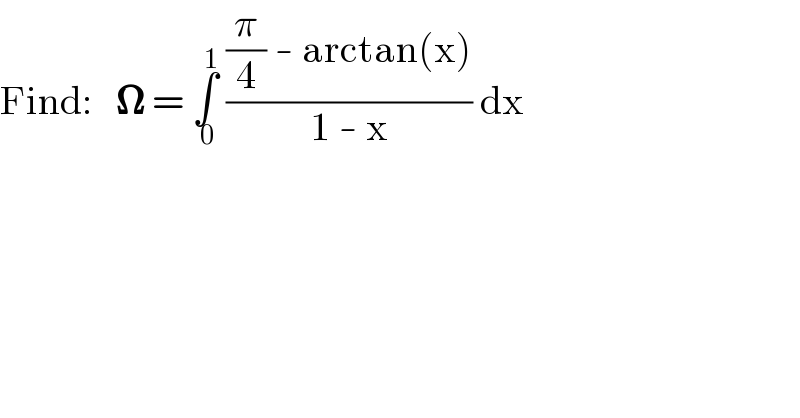Question Number 163144 by HongKing last updated on 04/Jan/22

$$\mathrm{Find}:\:\:\:\boldsymbol{\Omega}\:=\:\underset{\:\mathrm{0}} {\overset{\:\mathrm{1}} {\int}}\:\frac{\frac{\pi}{\mathrm{4}}\:-\:\mathrm{arctan}\left(\mathrm{x}\right)}{\mathrm{1}\:-\:\mathrm{x}}\:\mathrm{dx} \\ $$
Answered by mnjuly1970 last updated on 04/Jan/22
![−−− solution Ω= ∫_0 ^( 1) (( artan(((1−x)/(1+x))))/(1−x)) dx ((1−x)/(1+x )) = t ⇒ dx= ((−2)/((1+t )^( 2) ))dt Ω = 2∫_0 ^( 1) (( (arctan( t ))/(2t(1+t ))) dt =2 ∫_0 ^( 1) {(( arctan(t ))/t) −((arctan(t))/(1+t)) }dt Φ= ∫_0 ^( 1) (( arctan(t))/t) dt , Ψ =∫_0 ^( 1) ((arctan(t))/(1+t))dt Φ= ∫_0 ^( 1) Σ_(n=0) ^∞ (( (−1)^( n) t^( 2n) )/(2n+1))dt = G=β(2) Ψ = [ ln(1+t).arctan(t)]_0 ^1 −∫_0 ^( 1) ((ln(1+ t))/(1+t^( 2) )) = (π/8) ln(2) Ω= 2G − (π/4) ln(2) ■ m.n](https://www.tinkutara.com/question/Q163149.png)
$$−−− \\ $$$$\:\:\:{solution} \\ $$$$\:\:\:\:\Omega=\:\int_{\mathrm{0}} ^{\:\mathrm{1}} \frac{\:{artan}\left(\frac{\mathrm{1}−{x}}{\mathrm{1}+{x}}\right)}{\mathrm{1}−{x}}\:{dx} \\ $$$$\:\:\:\:\:\:\frac{\mathrm{1}−{x}}{\mathrm{1}+{x}\:}\:=\:{t}\:\Rightarrow\:{dx}=\:\frac{−\mathrm{2}}{\left(\mathrm{1}+{t}\:\right)^{\:\mathrm{2}} }{dt} \\ $$$$\:\:\:\:\:\Omega\:=\:\mathrm{2}\int_{\mathrm{0}} ^{\:\mathrm{1}} \:\frac{\:\left({arctan}\left(\:{t}\:\right)\right.}{\mathrm{2}{t}\left(\mathrm{1}+{t}\:\right)}\:{dt} \\ $$$$\:\:\:\:\:\:\:\:\:\:\:=\mathrm{2}\:\int_{\mathrm{0}} ^{\:\mathrm{1}} \left\{\frac{\:{arctan}\left({t}\:\right)}{{t}}\:−\frac{{arctan}\left({t}\right)}{\mathrm{1}+{t}}\:\right\}{dt} \\ $$$$\:\:\:\:\:\:\:\:\:\:\Phi=\:\int_{\mathrm{0}} ^{\:\mathrm{1}} \frac{\:{arctan}\left({t}\right)}{{t}}\:{dt}\:\:,\:\Psi\:=\int_{\mathrm{0}} ^{\:\mathrm{1}} \frac{{arctan}\left({t}\right)}{\mathrm{1}+{t}}{dt} \\ $$$$\:\:\:\:\Phi=\:\int_{\mathrm{0}} ^{\:\mathrm{1}} \:\underset{{n}=\mathrm{0}} {\overset{\infty} {\sum}}\frac{\:\left(−\mathrm{1}\right)^{\:{n}} {t}^{\:\mathrm{2}{n}} }{\mathrm{2}{n}+\mathrm{1}}{dt}\:=\:\mathrm{G}=\beta\left(\mathrm{2}\right) \\ $$$$\:\:\:\:\:\:\:\:\Psi\:=\:\left[\:{ln}\left(\mathrm{1}+{t}\right).{arctan}\left({t}\right)\right]_{\mathrm{0}} ^{\mathrm{1}} −\int_{\mathrm{0}} ^{\:\mathrm{1}} \frac{{ln}\left(\mathrm{1}+\:{t}\right)}{\mathrm{1}+{t}^{\:\mathrm{2}} } \\ $$$$\:\:\:\:\:\:\:\:\:\:\:\:\:\:\:=\:\frac{\pi}{\mathrm{8}}\:{ln}\left(\mathrm{2}\right) \\ $$$$\:\:\:\:\:\:\:\:\:\:\:\Omega=\:\:\mathrm{2G}\:−\:\frac{\pi}{\mathrm{4}}\:{ln}\left(\mathrm{2}\right)\:\:\:\:\:\:\:\:\blacksquare\:{m}.{n} \\ $$$$ \\ $$$$ \\ $$
Commented by HongKing last updated on 04/Jan/22

$$\mathrm{perfect}\:\mathrm{solution}\:\mathrm{my}\:\mathrm{dear}\:\mathrm{Sir},\mathrm{thank}\:\mathrm{you}\:\mathrm{so}\:\mathrm{much} \\ $$
Commented by mnjuly1970 last updated on 04/Jan/22

$${have}\:{a}\:{nice}\:{time}\:{sir} \\ $$
